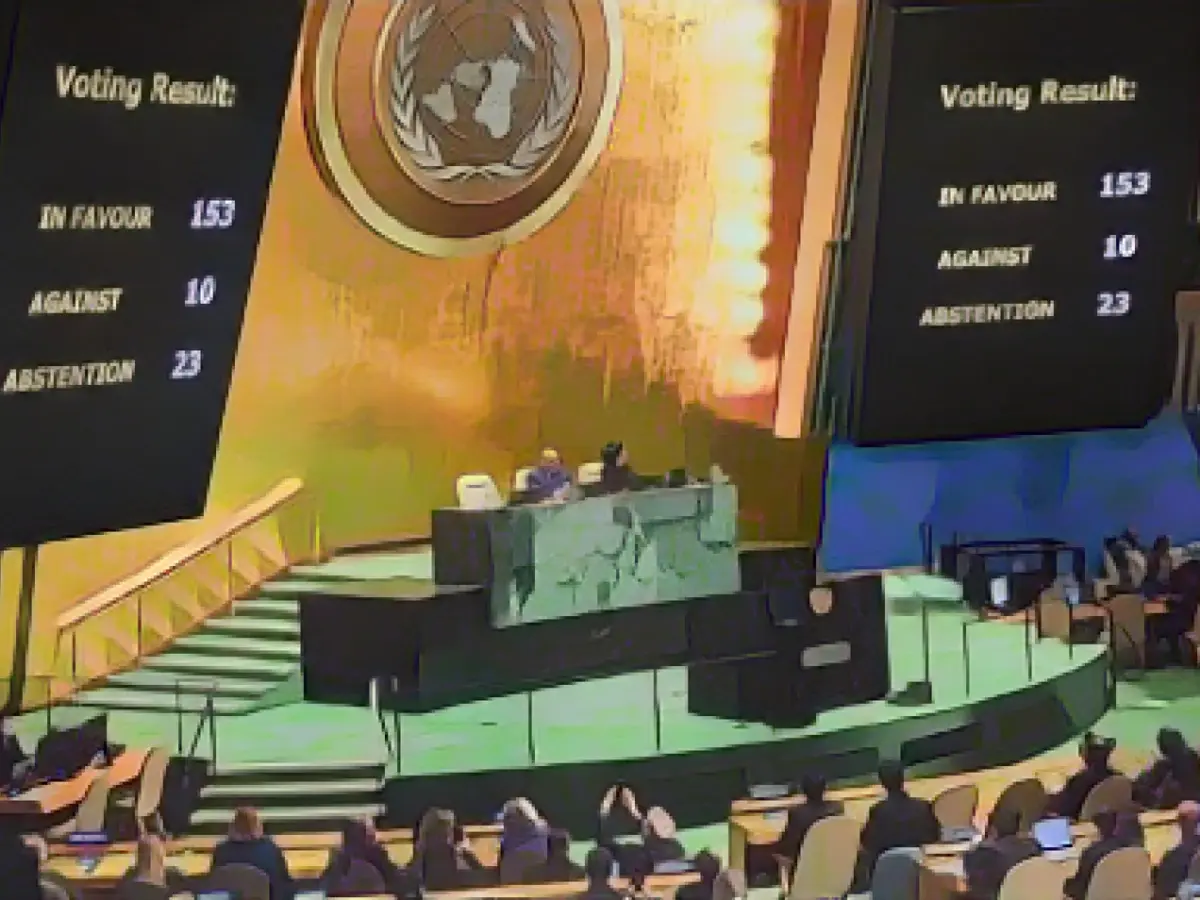Middle East conflict - UN General Assembly calls for ceasefire by resolution
The UN General Assembly has passed a resolution calling for an immediate humanitarian ceasefire in the Gaza Strip. The paper introduced by Egypt achieved the necessary two-thirds majority in New York. 153 countries voted in favor, 10 against. 23 countries abstained, including Germany.
The resolution presented Germany with a "difficult decision", according to the Federal Foreign Office via the short message service X, formerly Twitter. "We want to end the unbearable suffering of the people - in Israel and in Gaza".
The resolution calls for a "blanket ceasefire, but does not say why Israel is forced to defend itself: Because Hamas barbarically attacked Israel on Oct. 7. And because Hamas wants to continue destroying Israel." That is why Germany could not agree - but because it wanted to work to end the suffering of the Palestinians, it could not vote against it either.
UN General Assembly resolutions are not legally binding, but are considered symbolic. They also provide an insight into the mood of the world: alongside the Arab world, the majority of countries in the Global South voted in favor. The countries of the European Union presented a mixed picture: While the UK, for example, abstained alongside Germany, France and Greece, among others, voted in favor. Among those voting against were Israel, the USA, Paraguay, Austria and Guatemala.
"Catastrophic humanitarian situation"
A total of 153 countries voted in favor of the resolution, significantly more than at the end of October, when 120 countries of the UN General Assembly voted for a resolution to improve the humanitarian situation and for an immediate ceasefire in the Gaza Strip. At that time, 14 voted against and 45 abstained, including Germany. The UN General Assembly has 193 members, but for various reasons not all of them always vote.
The resolution that has now been passed, with its call for a permanent ceasefire, goes significantly further than the call for at least a temporary ceasefire at the time. The paper also expresses great concern about the "catastrophic humanitarian situation" in the Gaza Strip and calls for the immediate and unconditional release of all hostages.
Previously, amendments to the resolution had been introduced which, among other things, clearly mentioned the Islamist Hamas and clearly condemned the massacre of October 7. However, these failed to achieve the necessary two-thirds majority.
Guterres urges Security Council
The more powerful UN Security Council, whose resolutions are binding, once again failed to pass a ceasefire resolution last week. The body had previously only passed one resolution with a humanitarian focus on the conflict, mainly because the USA had always backed Israel. The adoption of the resolution by the UN General Assembly is also a reaction to the events in the Security Council.
UN Secretary-General António Guterres had personally urged the Security Council to support such a humanitarian ceasefire. In a corresponding letter to the Council, he referred to Article 99 of the UN Charter. This allows the Secretary-General to bring to the attention of the Security Council "any matter which, in his opinion, may endanger the maintenance of international peace and security" and, according to the UN, had not been applied for decades.
Read also:
- Year of climate records: extreme is the new normal
- Precautionary arrests show Islamist terror threat
- SPD rules out budget resolution before the end of the year
- Numerous oil, gas and coal lobbyists at climate conference
- Despite the resolution passing in the UN General Assembly, Germany faced a challenging decision due to the situation in the Gaza Strip, expressing their desire to end the suffering of people in both Israel and Gaza through Twitter.
- The resolution urged for a comprehensive ceasefire, yet failed to address why Israel felt compelled to defend itself, as Hamas had brutally attacked Israel on October 7 and continued to aim at Israel's destruction.
- Over 150 countries voted in favor of the resolution, with Germany abstaining due to their conflicting interests, wanting to cease the suffering yet unable to condone the actions of Hamas.
- The Arab world, alongside the majority of countries in the Global South, supported the resolution, while countries like Israel, the USA, Paraguay, Austria, and Guatemala voted against.
- The UN General Assembly resolution, although not legally binding, reflected the international community's desire for a ceasefire in the Gaza Strip, with a significant increase in support compared to the previous vote in October.
- The resolution also raised concerns about the catastrophic humanitarian situation in the Gaza Strip and called for the immediate release of all hostages.
- Initially, amendments to the resolution were introduced, including clear mentions of Hamas and condemnation of the October 7 massacre, but these failed to garner sufficient support in the General Assembly.
- Despite the failure of the UN Security Council to pass a binding resolution last week, the adoption of the UN General Assembly's resolution was a response to the events in the Security Council and a call for humanitarian intervention.
- UN Secretary-General, António Guterres, personally urged the Security Council to back a humanitarian ceasefire, drawing on Article 99 of the UN Charter, calling out international peace and security threats.
- In wake of the resolution, international attention continued to focus on the Middle East conflict, with various perspectives on Israel's defense and Hamas' actions, creating a complex web of diplomatic challenges and implications.
- The Middle East conflict remained a significant international concern, with the United Nations, various countries, and international organizations working towards a lasting ceasefire and resolution in the Gaza Strip and Palestine, with key players like the USA and Germany playing active roles in the peace negotiations.
Source: www.stern.de








